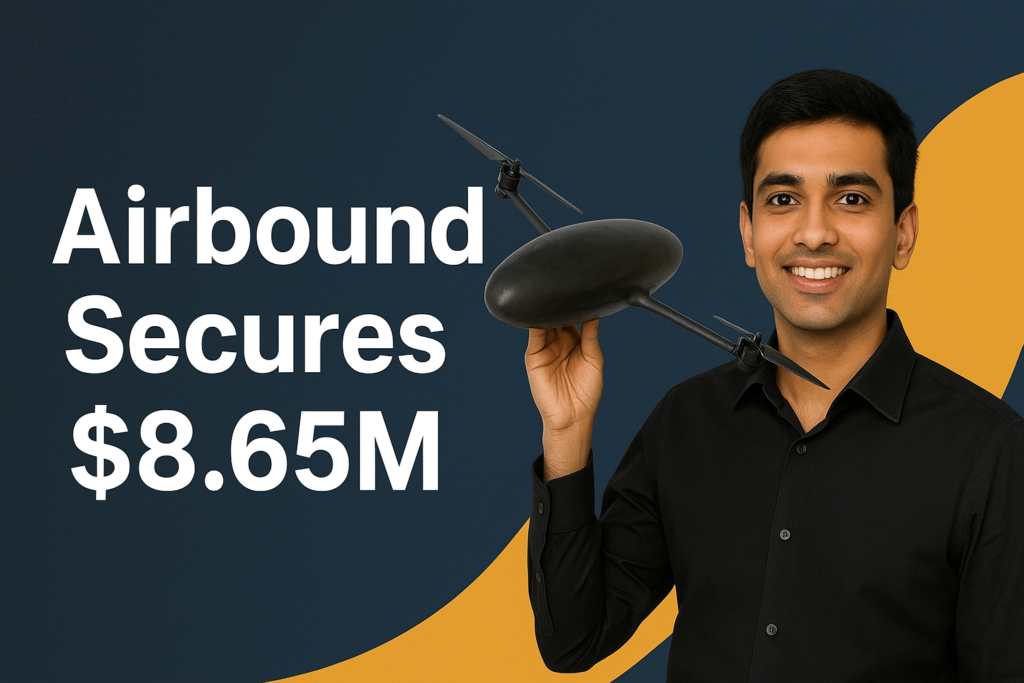The drone delivery revolution has arrived with undeniable force. Airbound drone funding of $8.65 million, led by Physical Intelligence co-founder Lachy Groom with participation from Humba Ventures, Lightspeed Venture Partners, and senior executives from Tesla, SpaceX, and Anduril, marks a pivotal inflection point in logistics technology. This Bengaluru-based startup possesses the technical architecture and strategic vision to achieve what the industry deemed impossible: deliveries at one cent per trip, democratizing access across geographically isolated communities throughout India and beyond.
One-Cent Drone Deliveries Transform Logistics
Airbound drone funding directly annihilates the industry’s most persistent barrier—prohibitive operational costs that render widespread adoption economically unfeasible. The company’s ultra-efficient blended-wing-body aircraft achieves a remarkable payload-to-aircraft mass ratio of 1 kilogram to 1.5 kilograms, meaning the drone carries nearly as much weight as itself. Currently, each delivery costs approximately ₹24 ($0.27), but strategic deployment of capital targets reduction to below ₹5 ($0.05) by late 2026. The startup projects one million daily deliveries by mid-2027, requiring production capacity expansion to over 100 drones daily. This cost structure delivers parcels at 20 times lower expense than traditional methods—a transformation that redefines feasibility across tier-two and tier-three markets where logistics infrastructure remains fundamentally broken.
Rocket-Style Drones Launch Vertically
The technical brilliance behind Airbound drone funding centers on proprietary tail-sitter design—aircraft sit vertically and launch upright like rockets before transitioning to horizontal flight. This configuration delivers four times the aerodynamic efficiency of conventional alternatives while maintaining three times lighter weight. The current drone weighs merely 3.3 pounds while carrying 2.2-pound payloads, with second-generation versions targeting 6.6-pound capacity at only 2.6 pounds aircraft weight. Through innovative carbon fiber manufacturing, engineers reduced airframe weight from six pounds to 400 grams. The vertical takeoff and landing capability eliminates infrastructure requirements entirely—no runways, catapults, or specialized zones necessary. This design achieves 100-kilometer range on single charge, combining multirotor versatility with fixed-wing efficiency in a configuration that fundamentally outperforms both pure approaches.
20-Year-Old Founder Raises Millions
Naman Pushp established Airbound in 2020 at age 15 during COVID-19 lockdown, inspired by drone delivery operations he observed globally. His early prototype—constructed from 2D slices held together with toothpicks and tape—earned $500 at a hackathon, catalyzing four years of intensive development. Now 20, Pushp declined Carnegie Mellon University admission to pursue his vision full-time, leading a 50-person team revolutionizing logistics through technological innovation. His engineering-first philosophy emphasizes that “autonomy makes logistics just a physics problem—a game of efficiency and weight.” The successful Airbound drone funding validates not merely technology but the vision of a founder who recognized fundamental market inefficiencies while still in high school, demonstrating both technical execution capability and extraordinary market timing acuity.
Medical Delivery Partnership With Top Hospital
Practical validation of Airbound drone funding materializes through partnership with Narayana Health, one of India’s largest hospital networks. This three-month pilot deploys drones for medical logistics, targeting ten daily deliveries of blood samples, medical tests, and critical supplies. Community Health Centers and Primary Health Centers often lack efficient connectivity for transporting biological samples to testing laboratories—ground transportation faces traffic congestion, poor road infrastructure, and time-sensitive sample degradation. Airbound’s solution bypasses these constraints entirely, providing direct point-to-point transport that dramatically reduces transit time while maintaining sample integrity. Success in medical logistics establishes operational credibility enabling expansion into quick commerce, food delivery, and other last-mile segments where logistics costs significantly impact profitability, with broader market adoption planned for 2026.
Tesla and SpaceX Leaders Back Indian Startup
The investor composition behind Airbound drone funding provides crucial market validation. Beyond institutional investors like Lightspeed Venture Partners and Humba Ventures, the round attracted senior leaders from Tesla, SpaceX, and Anduril—operators with profound expertise in scaling complex hardware systems and autonomous technology. Lachy Groom brings experience from Physical Intelligence and a proven track record identifying transformative technologies early in development cycles. Lightspeed partner Hemant Mohapatra articulated the conviction: “Drones are the future of deliveries and we are highly optimistic about this game-changing technology revolutionizing logistics.” The involvement of aerospace and defense veterans carries particular significance—these individuals navigated hardware scaling, regulatory compliance, and autonomous system deployment at the highest complexity levels, indicating conviction that Airbound possesses executable strategy for market penetration and operational scaling.
The Path Forward
With over $10 million in total capital raised and production capabilities expanding, Airbound stands positioned to validate whether ultra-low-cost autonomous delivery transitions from theoretical possibility to operational reality. The next three months of pilot operations with Narayana Health will provide crucial real-world data on system reliability, cost structure, and operational scalability. If successful, the implications ripple across healthcare access in rural areas, quick commerce profitability in tier-two cities, disaster relief logistics, and agricultural supply chain optimization. The convergence of mature autonomy technology, resolved regulatory frameworks, lightweight aerospace materials, and strategic Airbound drone funding creates unprecedented conditions for adoption. This $8.65 million investment represents a wager on the fundamental transformation of how goods move through physical space—a transformation that begins now, in India, with profound global implications.
Learn Business Model Of Airbound

My Name is Adarsh and I am Empowering startups with high-quality content at Startups Union and bridging the gap between brand stories.
